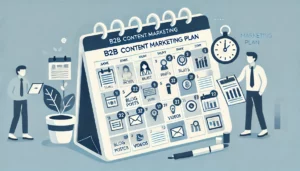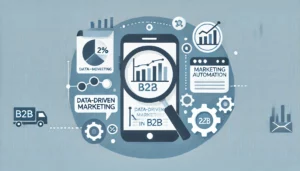Leveraging Interview-Style Podcasts for B2B Lead Generation

In the realm of B2B marketing, podcasts have emerged as a powerful tool for reaching and engaging with a professional audience. Among the various podcast formats, interview-style podcasts offer a unique opportunity for lead generation. By inviting your ideal prospects as guests, you can build meaningful relationships, showcase your expertise, and create valuable content for your audience. This blog explores how to leverage interview-style podcasts for B2B lead generation effectively.
Benefits of Interview-Style Podcasts
Interview-style podcasts provide several advantages for B2B lead generation. Firstly, they allow you to build direct relationships with potential clients by offering them a platform to share their insights and experiences. This not only helps in establishing a connection but also positions you as a thought leader in your industry.
Building Relationships with Prospects
Inviting prospects to be guests on your podcast creates an opportunity for direct interaction. This personal connection can lead to stronger business relationships and open doors for future collaboration. By providing a platform for your prospects to share their expertise, you show respect for their knowledge and create a positive impression.
Establishing Thought Leadership and Authority
Hosting a podcast with industry experts as guests positions you as a thought leader in your field. Your audience will associate your brand with valuable insights and industry knowledge. This enhances your credibility and increases the likelihood of prospects considering your business for their needs.
Identifying Ideal Prospects
The success of your interview-style podcast largely depends on selecting the right guests. Identifying and inviting ideal prospects can help you create valuable content and foster meaningful connections.
Defining Your Target Audience
Start by clearly defining your target audience. Understand the demographics, interests, and pain points of your ideal clients. This information will guide you in selecting prospects who align with your business goals and audience preferences.
Researching and Selecting Potential Guests
Once you have a clear understanding of your target audience, begin researching potential guests who fit this profile. Look for industry leaders, influencers, and decision-makers who have valuable insights to share. LinkedIn, industry conferences, and professional networks are great places to find potential guests.
Criteria for Choosing the Right Prospects
When selecting prospects, consider factors such as their expertise, relevance to your audience, and their potential interest in your products or services. Choose guests who can provide valuable content and insights while also being potential leads for your business.
Inviting Prospects as Guests
Crafting a compelling invitation is crucial for securing interviews with your ideal prospects. Highlight the benefits for the guest and provide a clear value proposition.
Crafting a Compelling Invitation
When reaching out to potential guests, personalize your invitation and clearly explain why you want them on your podcast. Emphasize the benefits for the guest, such as exposure to your audience, the opportunity to share their expertise, and the potential for networking and collaboration.
Benefits for the Guest
Outline the specific benefits your podcast offers to the guest. This could include reaching a new audience, enhancing their personal brand, and gaining exposure to potential clients or partners. Providing detailed information about your podcast’s reach and audience demographics can also help persuade potential guests.
Tips for Reaching Out and Securing Interviews
Be professional and respectful in your outreach. Follow up if you don’t receive a response initially, but avoid being pushy. Use multiple channels for outreach, such as email, LinkedIn messages, and professional networks. Providing a flexible schedule for the interview can also make it easier for busy professionals to participate.
Preparing for the Interview
Preparation is key to conducting a successful interview. Thorough research and a well-structured format will help you engage your guest and provide value to your audience.
Researching Your Guest and Their Business
Before the interview, take the time to research your guest and their business. Understand their background, expertise, and recent activities. This will enable you to ask insightful questions and facilitate a more meaningful conversation. Additionally, understanding their business will help you identify potential areas for collaboration and value exchange.
Creating an Engaging Interview Format
Develop a clear and engaging interview format that keeps the conversation flowing smoothly. Start with an introduction, followed by a series of structured questions, and conclude with a summary and call to action. A well-planned format ensures that you cover all important topics while allowing for natural conversation.
Developing Thoughtful Questions
Prepare a list of thoughtful and relevant questions that align with your guest’s expertise and interests. Open-ended questions encourage detailed responses and deeper discussions. Avoid generic questions and focus on topics that provide value to both your guest and audience.
Conducting the Interview
Executing the interview professionally and effectively is crucial for creating engaging content and building a positive relationship with your guest.
Best Practices for a Successful Interview
Start the interview by making your guest feel comfortable. Briefly explain the interview format and topics to be covered. During the interview, actively listen to your guest and ask follow-up questions based on their responses. Maintain a conversational tone and avoid interrupting.
Techniques for Fostering Engaging Conversations
Encourage your guest to share personal anecdotes, experiences, and insights. This makes the conversation more relatable and interesting. Use active listening techniques, such as nodding and verbal affirmations, to show your engagement. Summarize key points and ask for elaboration to keep the discussion dynamic.
Ensuring a Positive Experience for Your Guest
Ensure that the interview process is smooth and enjoyable for your guest. Provide clear instructions and technical support if needed. After the interview, thank your guest and provide details on when and where the episode will be published. A positive experience increases the likelihood of future collaborations and referrals.
Post-Interview Strategies
The work doesn’t end once the interview is over. Effective post-interview strategies can help you build relationships, leverage the content, and convert guests into leads.
Building Relationships Beyond the Interview
Stay in touch with your guests after the interview. Share the published episode with them and encourage them to promote it within their network. Engage with them on social media and explore opportunities for further collaboration. Building a lasting relationship can lead to valuable business opportunities in the future.
Leveraging the Interview for Follow-Up Opportunities
Use the interview as a basis for follow-up conversations. Discuss potential business opportunities, partnerships, or collaborations that were mentioned during the interview. The initial interaction sets the stage for deeper engagement and lead nurturing.
Converting Guests into Leads
Convert your guests into leads by identifying their needs and offering solutions that align with your services. Personalize your follow-up communication and provide valuable resources or offers that address their pain points. By demonstrating your expertise and understanding of their business, you increase the likelihood of converting them into clients.
Promoting the Podcast
Promotion is crucial for maximizing the reach and impact of your podcast. Effective promotion strategies will help you engage your audience, drive traffic, and generate leads.
Strategies for Promoting Your Podcast Episodes
Promote your podcast episodes across various channels to reach a broader audience. Share episodes on your company’s social media profiles, website, and email newsletters. Collaborate with your guests to promote the episodes on their networks as well. Utilizing multiple channels increases the visibility of your content and attracts more listeners.
Engaging Your Audience Through Social Media and Email
Social media and email are powerful tools for engaging your audience. Create engaging posts and stories on platforms like LinkedIn, Twitter, and Facebook to promote new episodes. Use email marketing to notify your subscribers about new episodes, highlight key insights, and encourage them to share the content with their networks.
Using the Podcast to Drive Traffic and Generate Leads
Incorporate calls-to-action (CTAs) within your podcast episodes to drive traffic to your website or landing pages. Offer valuable resources, such as eBooks, whitepapers, or free consultations, to encourage listeners to engage further with your brand. By providing value and clear next steps, you can convert listeners into leads.
Measuring Success and Optimization
Tracking the performance of your podcast is essential for understanding its impact and optimizing your strategy for better results.
Key Metrics to Track Podcast Performance
Monitor key metrics such as the number of downloads, listens, and subscriber growth. Engagement metrics, like social media shares, comments, and mentions, provide insights into how your audience is interacting with your content. Analyzing these metrics helps you understand what’s working and identify areas for improvement.
Using Feedback and Analytics to Improve Your Strategy
Collect feedback from your audience through surveys, social media, and direct interactions. Use this feedback, along with analytics data, to refine your content and promotion strategies. Experiment with different formats, topics, and promotion tactics to see what resonates best with your audience.
Continuous Optimization for Better Results
Continuous optimization is key to long-term success. Regularly review your podcast performance and make data-driven adjustments to your strategy. Stay updated with industry trends and incorporate new techniques and tools to keep your content fresh and engaging.
Conclusion
Interview-style podcasts offer a unique and effective way to generate leads in the B2B space. By inviting your ideal prospects as guests, you can build valuable relationships, showcase your expertise, and create engaging content for your audience. With the right strategies for preparation, execution, and promotion, your podcast can become a powerful tool for driving business growth and generating high-quality leads. Start leveraging interview-style podcasts today to elevate your B2B marketing efforts.
FAQs
1. How can I identify the right prospects to invite as podcast guests?
Identify your target audience by understanding their demographics, interests, and pain points. Research potential guests who align with your business goals and audience preferences. Look for industry leaders, influencers, and decision-makers who can provide valuable insights.
2. What are some tips for inviting prospects to be guests on my podcast?
Personalize your invitation and highlight the benefits for the guest, such as exposure to your audience and the opportunity to share their expertise. Use multiple outreach channels and follow up if necessary. Provide a flexible schedule to accommodate their availability.
3. How can I create engaging content for my podcast interviews?
Prepare by researching your guest and their business. Develop a clear interview format and ask thoughtful, open-ended questions. Encourage your guest to share personal anecdotes and insights to make the conversation more relatable and interesting.
4. What are some effective strategies for promoting my podcast?
Promote your podcast across social media, your website, and email newsletters. Collaborate with your guests to share the episodes on their networks. Use calls-to-action within your episodes to drive traffic to your website or landing pages.
5. How can I measure the success of my podcast?
Track metrics such as downloads, listens, and subscriber growth. Monitor engagement metrics like social media shares, comments, and mentions. Collect feedback from your audience and use analytics data to refine your content and promotion strategies.





